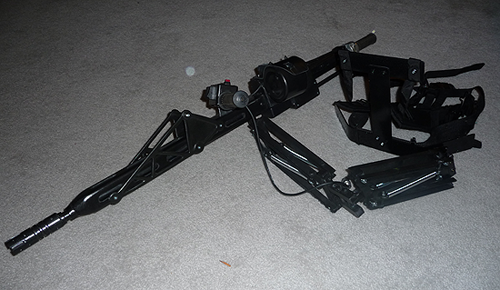Halloween planning and construction has been in full swing for a couple months now. While I can’t yet reveal what’s in store for this year, I thought I’d finally publish this post about something from last year…
One of the hits of the last Halloween party (and the subsequent trick-or-treaters) was the lighted sidewalk…ala MJ’s Billie Jean video. Plenty of people asked how I did it so I thought I’d oblige.
The concept of the project was all Donna’s fault…I mean credit. She got the idea sometime in September and challenged me to do it. As some of you might know, challenging an engineer to make something is about the same as saying “hey, can you please drop everything and built this”, because it will happen. In thinking about it I came up with these goals:
- Keep any additional platform low to ground. I don’t want people to feel like they’re stepping up onto something.
- Span the whole 12-15 length of our sidewalk. It wouldn’t look too cool if only a few feet were done.
- Outdoor friendly and fairly immune to moisture (who knew if it’d be raining the night of the party).
- And most of all it would have to work with fairly light people but not crumble under foot of heavier ones. I had to figure people might start dancing on this, so it’d have to take a fair bit of abuse.
I considered a light source for quite a while – everything from those closet tap lights, to rope lighting. I decided I wanted to stick with low voltage just in case there were any moisture issues; I didn’t want to get into putting this thing on a GFCI or something. For the best combination low profile, low cost, good brightness, and instant-on behavior I decided on ultra bright white LEDs. I found a place online selling them for 50 cents a piece. They also sell little reflector cones to fit over the LED to help project the light.
Next I had to think about the means to make a translucent step that could easily support 300 lbs or more. Acrylic was a pretty easy choice given other materials (like polycarbonate) are either more expensive or harder to work with. I did some crude calculations to determine that 1/2 inch panels would be sufficiently strong if supported on 4 sides. Our sidewalk extends 12 feet from the front door with a 3 foot jog at the end. I decided on using six panels, each 2 feet square, to span the distance. There would be roughly a foot or more on each end of the sidewalk not accounted for, but it’d work out pretty good.
The real trick was thinking of a switching mechanism. I considered micro switches, limit switches, and finally decided to keep it simple (and cheap!) and make a home-brewed pressure switch. My idea was to tape a wire to the upper and lower pieces of each step with some foil duct tape and separate them with a bit of weather stripping. As the panel is compressed the two pieces of foil make contact and the lights go on. My main worry was whether the foil was really very conductive. A quick little test assured me it was. I decided to place two switches per each step on the edges you walk across. Closing either or both switches would complete the circuit. The good thing about this is that as you’re walking along, even if you just catch the edge of the next step it will light. Having to step in the center of each step would be much less spontaneous.

It wasn’t until the week of the party that all my plans were set and all the supplies arrived. The last things to determine were the structure holding the panels and the actual wiring circuit. To keep the whole thing low I built the structure using 2×2’s and 2×4’s laying flat. This limited the height to only an inch and a half. The 2×2’s were used to make a square frame to support each panel. The 2×4’s were just used to flesh out the sides of the sidewalk to add extra width.

The circuit I came up with was a pretty simple parallel arrangement of two switches and two LEDs. This wiring would be repeated for each step.

Things got trickier though when I had to figure out how to actually run the wiring to have the switches and lights in the desired locations. After folding the schematic around, the circuit for each step became:

Each step is modular in that each was wired separately, and tested, and later they were all interconnected. Running the wires was tedious. The first step probably took 45 minutes to wire, and each to follow went progressively faster. By the time I got to the sixth one, I was running wiring and soldering without thinking and finished it in about 20 minutes.
Through testing (the specs weren’t published) the LEDs needed around 3 volts. Since the LEDs were in parallel and each step parallel with each other, I found I could run the whole thing off only two AA batteries (in series). I did add a second set of AA’s in parallel, just to ensure enough battery life. Turns out, that was more than enough; almost a month later and it was still working like day one! By the time we started getting morning frosts in late November I finally hauled the whole thing back in the garage. Will we see it again for a future party?




























